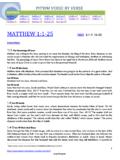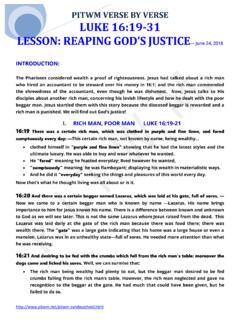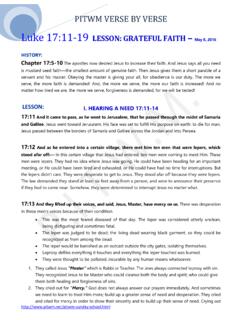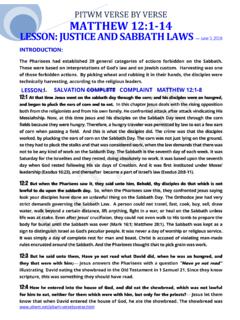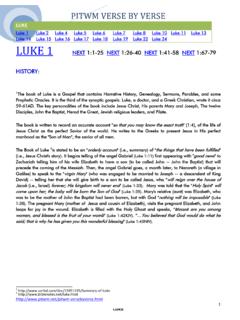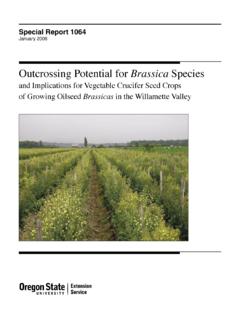Transcription of PITWM VERSE BY VERSE MATTHEW 13:24-33
1 PITWM VERSE BY VERSE MATTHEW 13:24-33 LESSON: PARABLES OF GOD S JUST KINGDOM June 10, 2018 INTRODUCTION: MATTHEW 13:18-23 Jesus tells His first parable in this chapter concerning the sower, the seed, and the soil: it s called "The Parable of the Sower" or "The Parable of the Four Soils" (13:1-8). But the disciples did not know what it meant, so Jesus begins to explain its meaning and purpose (13:18-23). 1 The story was about the seed rather than the farmer. The seed means the Word of God. The Sower is the farmer or in the spiritual, the witness. The soil is the heart. It is the message about the Kingdom of God. The farmer scatters the seed.
2 The people who hear the Word of God receive it in different ways. There were four types of soil or hearts. 1. Hard soil is the wayside soil, fertile but hard. They hear the message but do not understand it, thus allowing Satan to steal it from them. 2. Shallow soil is the rocky soil, fertile but no depth. They hear the message but the message doesn t root very deeply, thus when persecution comes, his enthusiasm fades and drops out. 3. Weedy soil is the thorny ground, fertile but possessed with weeds. They hear the message, but the cares of this world and the deitfulness of riches choke out the Word and one becomes unfruitful. 4. Good soil is the understanding heart, fertile and prepared.
3 They hear the message, receives it, and bears fruit bringing forth a hundred fold, some sixty, and some thirty into the Kingdom. When we talk about the kingdom of heaven, we re not talking about a geographic place, but it s a spiritual realm in which God rules and reigns, going into eternity. I. PARABLES OF THE TARES MATTHEW 13:24-30 13:24 Another parable put he forth unto them, saying, The kingdom of heaven is likened unto a man which sowed good seed in his field: Jesus uses another parable concerning weeds and thistles to explain the kingdom of heaven: It s called "The Parable of the Wheat and the Tares" or "The Parable of the Weeds.
4 " The kingdom of heaven is like a man (Christ) who sows good seed (righteousness) in his field (the world). And the field which is the world is Christ s by right because He created it. Therefore, He rules and reigns over the righteous seed planted. And the good of it will come forth at its determined time. 13:25 But while men slept, his enemy came and sowed tares among the wheat, and went his way. The man (Christ) has sown good seeds (righteousness). But while men are not paying attention; asleep, his enemy (Satan) comes without his knowledge, and sows tares (weeds; wickedness; evilness, and falseness) among the wheat (the good seed sown), and then the enemy leaves.
5 Satan does his work in darkness, behind closed doors, when you re not watching; undercover because he s a sworn 1 LESSON: PITWM VERSE BY VERSE enemy of God. Note, that it was in the same field as the Lord s. The bad are sown among the good. Some within the world and within the church have not been sown by the Lord. They may even look like they belong to Christ, but they do not. Get your House in order! They came while men slept. 13:26 But when the blade was sprung up, and brought forth fruit, then appeared the tares also. The growth of the blade of wheat comes up, bringing fruit, but also appears tares.
6 The tares themselves were called "darnel", some form of plant or wild corn that was slightly poisonous and narcotic. When eaten it would cause dizziness and nausea. It was called the bastard wheat. Its roots became intertwined with the roots of the wheat. However, it is during the fruit-bearing stage that the difference appears. A person s nature will eventually come forth: what he s thinking; what s on the inside. They will eventually hurt the wheat: their thoughts, their attitudes, their mood swings. They will drain the nourishment which will eventually deplete the wheat. 13:27 So the servants of the householder came and said unto him, Sir, didst not thou sow good seed in thy field?
7 From whence then hath it tares? So, the servants; the slaves of the man comes to him to tell him what has happened, and how his field is looking. There were tares (weeds) growing among the good seed, knowing that good seed was planted. So, where are the tares coming from? 13:28 He said unto them, An enemy hath done this. The servants said unto him, Wilt thou then that we go and gather them up? The man tells his servants that they have an enemy among them that has done this thing. So the servants ask if they should pull the tares up. This is what we have to remember: Scripture reveals that in the beginning God is Creator.
8 Jesus Christ, the Son of Man is the original Sower. He is the Master owner of the field or world. God created man to be prefect, that is in Our image, after our ( :26), and He planted within man a spirit to do right. But immediately after Creation, the other sower, the devil, went right to work. He began with Adam and Eve ( :1), and ever since then he has sown nothing but tares (unrighteous) among God s "good seed." 13:29 But he said, Nay; lest while ye gather up the tares, ye root up also the wheat with them. However, the man says no, for if they pulled up any of the tares (weeds) that have been rooted in the ground along with the wheat, they are in danger of destroying the wheat before the fruit becomes mature, thereby, causing harm to the wheat.
9 False professing converts produce no lasting fruit; they may produce outstanding work, but not real fruit. Work is something you take ownership of; something you do by the reason of your strength. Fruit is something god produces within you; that of the Spirit. You give out producing work. You continue through God s strength producing fruit. The wheat and the tares or the believers and the unbelievers must live side by side in the world for a while until the harvest (judgment) of all mankind comes. Christ is the only judge when He returns. 1. A person is to be judged for his whole life. He is not to be judged for a single act or for a particular period of his life.
10 No one sees another person s whole life. In fact, very little of a person s life (thought or activity) is seen by any one individual. 2. A person may make a serious mistake or go through a stage of terrible sin. Then by the eternal mercy and eternal grace of God, he may turn back to Christ and make the rest of his life a wonderful service for God. PITWM VERSE BY VERSE 3. Any person who is judged to be righteous today may fall into sin later, years later. Only God can see the whole of a life. Only God can see and know all the facts that led the person to sin: facts within his being and facts without; pleasures within and pleasures without; relationships with and relationships without.
